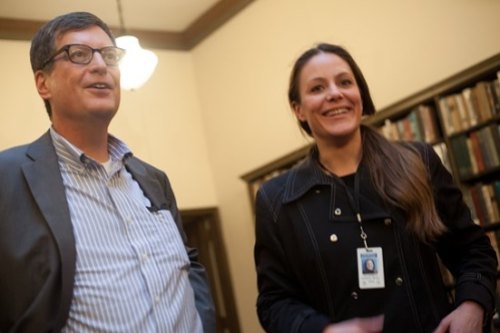 Beth Healy today offers an update on who might buy The Boston Globe and its related properties, which include the Telegram & Gazette of Worcester and Boston.com. She reports that eight potential buyers are circling, and that the deadline for submitting bids is June 27.
Beth Healy today offers an update on who might buy The Boston Globe and its related properties, which include the Telegram & Gazette of Worcester and Boston.com. She reports that eight potential buyers are circling, and that the deadline for submitting bids is June 27.
Three story lines worth following:
1. The Taylors are still in the mix. It would be a comeback of epic proportions if Steve and Ben Taylor were to repurchase the Globe 20 years after their family sold it to the New York Times Co. for $1.1 billion. And for those of us who want to see the Globe wind up in responsible local hands, it would probably represent the best outcome.
The question since 2009, when the Taylors made their first failed attempt to reacquire the Globe, is whether they can raise enough money to buy the paper and run it properly. Maybe the Taylors can combine forces with the Kraft family, who own the New England Patriots and are said to be interested.
Former Globe president Rick Daniels is in the mix as well. But he’s partnering with a private-equity executive, which raises all kinds of red flags.
2. The “face of hell” emerges. “Papa Doug” Manchester, as he likes to be known, bought the San Diego Union-Tribune in 2011 and renamed it U-T San Diego, which ought to be reason enough to disqualify him. But it gets worse. Manchester, a hotel magnate, is a conservative opponent of same-sex marriage who has shaped his paper’s coverage to serve his business interests. Here is a charming excerpt from a profile of Manchester by Voice of San Diego’s Rob Davis:
Few San Diegans could have evoked the visceral cancel-my-subscription-today reaction that Manchester did when he bought the Union-Tribune. He has a reputation: egomaniacal, short-tempered, litigious, unrelenting. Some fear him. Two politically connected people warned me not to write a negative word about him. “If there is a hell, Doug Manchester is the face of it,” one said.
And now he’s said to be interested in the Globe.
3. The Globe’s headquarters may be sold. Healy reports that several prospective buyers would sell the Globe’s Dorchester plant if they succeed in buying the media properties. This strikes me as odd, since the Globe has had some success in taking on outside printing jobs such as the Boston Herald, The Patriot Ledger of Quincy and The Enterprise of Brockton.
I don’t understand how the Globe can keep the presses rolling unless it stays put. On the other hand, space isn’t exactly at a premium at 135 Morrissey Blvd. these days. Maybe the idea is to sell the building, lease back part of it and rent out the rest.
No doubt we’ll learn more in the weeks to come.
Image via Today’s Front Pages at the Newseum.



